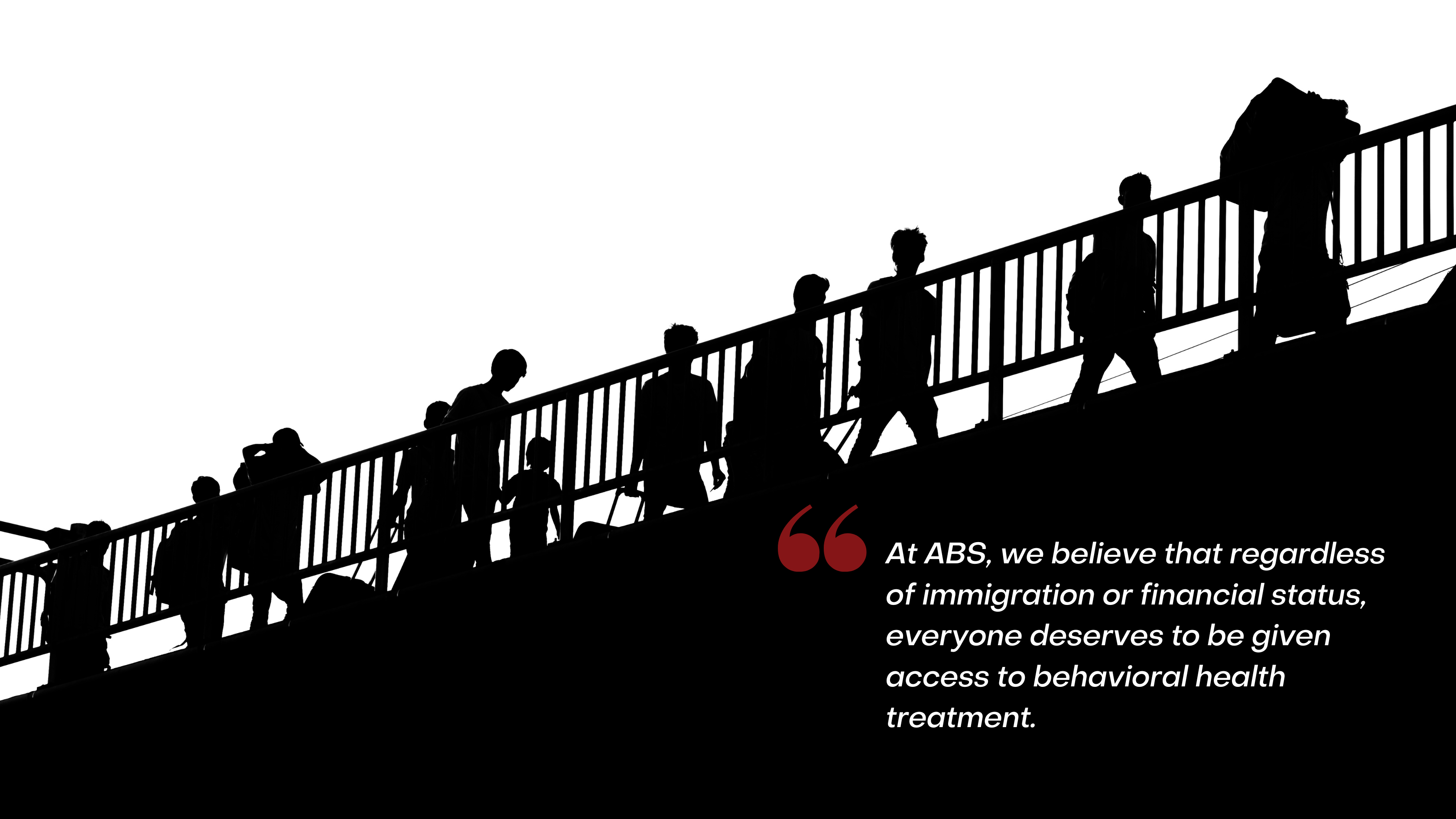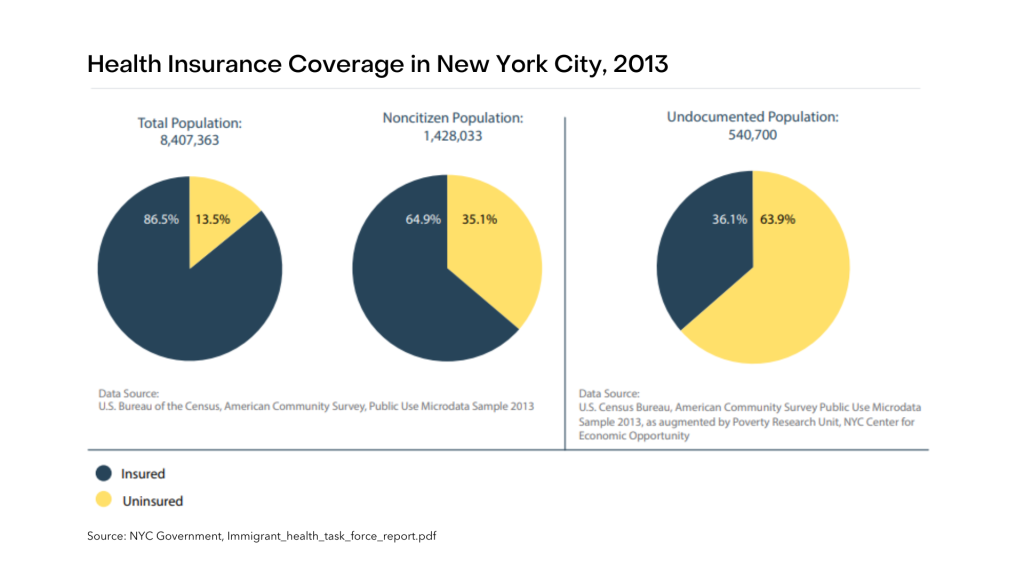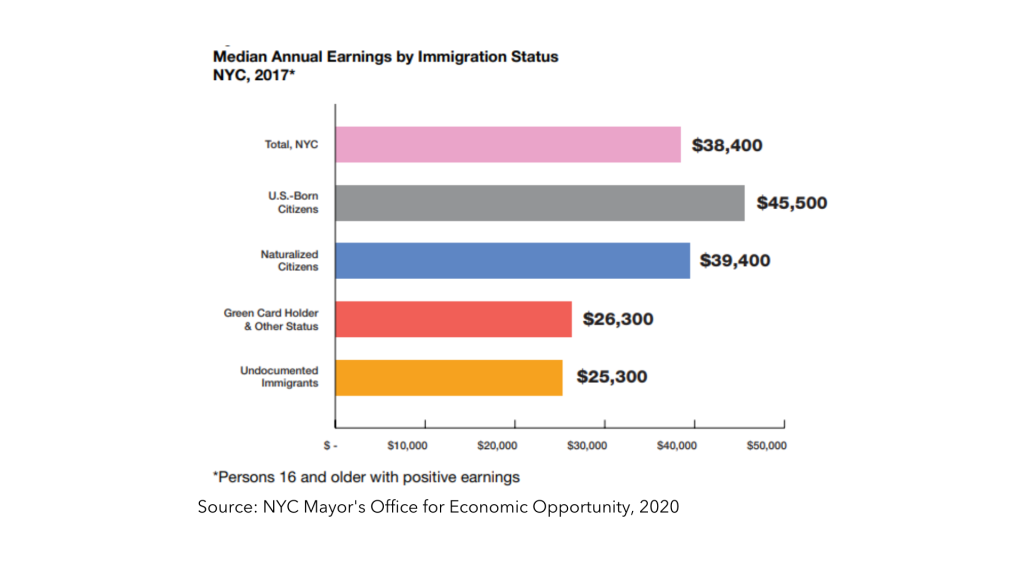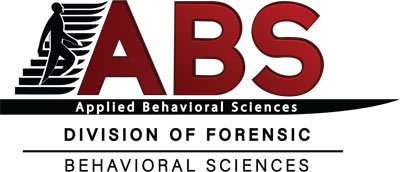
Undocumented Immigrants with Behavioral Health Issues Left Untreated
An estimated 45% to 71% of the 11.3 million undocumented immigrants living in the United States are lacking health coverage – comprising the largest group of uninsured individuals in the country. Of these, 725,000 reside in New York State.
This data have not yet accounted for the recent increase in the number of undocumented immigrants crossing the southwest border in 2022. Meaning, more and more undocumented immigrants are becoming vulnerable as they lack access to healthcare, specifically mental healthcare.
Existing studies on the mental health of this population reveal that living as undocumented in the U.S. is chronically stressful which places a toll on their mental health. With the current sociopolitical climate exacerbated by the Covid-19 pandemic, life for the undocumented may be unbearable.
Our organization, Applied Behavioral Sciences (ABS), intends to extend its highly effective human betterment programs to be readily accessible for the undocumented population who are indigent and are in serious need of behavioral treatment. This undertaking may be possible with the help of individuals and organizations who would be willing to donate to this cause.
No access to behavioral health care
Except for emergency care, undocumented immigrants are mostly ineligible for state and federal healthcare programs like Medicaid and Medicare or most federal health benefits.

Undocumented immigrants are only permitted by law to access federal benefits that are deemed essential to preserve life or ensure safety in emergency situations, such as emergency Medicaid, access to care in hospital ERs, or access to healthcare and nutrition programs under the Special Supplemental Nutrition Program for Women, Infants, and Children (WIC), under the condition of satisfying all Medicaid’s other nonfinancial and financial eligibility requirements in order to be qualified for these emergency care.
Some of them are more fortunate and are qualified for benefits that are only available in certain states, while others with sufficient income can purchase private health insurance (without the benefit of federal subsidies).
However, with a median household income of $36,000, which is over $20,000 less than that of the general population, most undocumented immigrants live in poverty and cannot afford to buy health insurance.
While many undocumented immigrants have been part of the labor force and contributed to the economic growth of our country, still there is a significant number who fall through the cracks and are in desperate need of help.

Being unemployed and ineligible for federal health care benefits, undocumented individuals with behavioral health issues such as substance abuse, gambling addiction, sex addiction, and mental illnesses, are left untreated.
Without treatment, behavioral illness has devastating effects on both the affected person and society. Untreated mental health disorders can lead to poor quality of life, unnecessary disability, unemployment, family breakdown, substance misuse, homelessness, and incarceration.
Very high rates of mental distress
Undocumented immigrants have risked their lives to cross the border to flee from wars, poverty, violence, persecution, and natural disasters, while some are survivors of human trafficking.
Most of them had hoped for a promise of a better life, but unfortunately, they have been living in the shadows in the U.S. – battling constant fear of deportation, poverty, and a mix of complex struggles—which create a toll on their mental health.
According to Dr. Luz Maria Garcini, there are “constant chronic stressors that [undocumented migrants] face in their everyday lives across multiple domains, including work, family (e.g., separation from family), discrimination, stigmatization, exploitation, socioeconomic adversity, and limited healthcare, among many others”, that make it hard for them to cope mentally and emotionally.
A systematic evaluation of 40 publications revealed that undocumented immigrants were more likely to experience depression, anxiety, and post-traumatic stress disorder than other groups.
They may also experience a range of other mental health effects as a result of their undocumented status, including substance abuse, destructive behavior (joining a gang), and disillusionment, despair, helplessness, fear, or hopelessness.
In addition to PTSD and other psychological disorders, undocumented individuals are also at a high risk of suicidal ideation due to distress associated with social marginalization, intergenerational conflicts, and cultural stress.
Risk of incarceration
If these individuals are left untreated, they face a higher risk of incarceration. Inappropriate behavior or misinterpreted acts may result due to the difficulty in fitting in with society caused by mental illness that may lead to getting arrested.
Arrest and incarceration often destabilize an individual’s life. For some, even brief incarceration leads to adverse consequences, including loss of employment and future employment opportunities, disruptions in family life and social connections, and even loss of housing.
ABS is a leading agency providing services to justice-involved individuals referred by courts to provide behavioral health treatment. However, the courts are now swamped with undocumented individuals who have no means of access to insurance nor make out-of-pocket payments for behavioral care. If these undocumented individuals fail to attend behavioral treatment and make progress towards personal betterment and prevent recidivism they may have to serve jail time and may lose child custody.
The societal cost of incarceration
In the recent report released by Statista Research Department on August 5, 2022, the United States has the highest number of incarcerated individuals worldwide — having 2.1 million prisoners, with violent offenses as the most common type of committed crimes.
Incarceration in the United States has a notoriously high economic cost. Nearly 2.2 million American citizens are behind bars, rendering them unable to work and support the economy in addition to the roughly $80 billion spent on prisons each year in the U.S. According to Hedwig (Hedy) Lee, a professor of sociology at Washington University in St. Louis, the price that inmates’ families must pay is still a frequently disregarded expense.
To keep inmates incarcerated in neighborhood jails, New York spends billions of dollars. An average New York county spent more than $225 to imprison one person for only one night in 2019 — this translates to more than $82,000 annually. In actuality, funds for prisons have in

creased despite a decrease in the overall prison population. Each dollar spent on the jail comes at the expense of spending money on other programs that could contribute to the development of safe and healthy communities.
There is a need to reduce criminal behavior and increase utilization of alternatives to incarceration programs. Prior studies indicate that expanding access to mental health care may be a successful strategy for lowering criminal behavior as it is found that about 2 in 5 people who were incarcerated have a history of mental illness: 37% are being held in state and federal prisons while 44% are in local jails and most have questionable behavior.
ABS offers human betterment programs as alternatives to incarceration, and where participants monitored by state parole or city probation can be rehabilitated. To avoid unnecessary detention clients can receive needed help if funding for treatment was made available.
Granting Free Access to ABS Human Betterment Programs
The ABS Division of Forensic Behavioral Sciences actively shares in the responsibility to correct defiant behavior and diminish criminal activity in New York by providing fiscally responsible clinical service in the specialties of forensic behavioral and mental health.
ABS meets the mental and behavioral health needs of clients seeking help and those referred by criminal justice systems, child welfare agencies.
As we envision a society where no one in need of behavioral health service is left untreated, we are advancing the need of the most underserved population: the undocumented immigrants.
With the help of our individual sponsors and corporate donors, we are getting more and more undocumented individuals to carry on with their ABS programs such as:
- Anger Management and Stabilization Program
- Violence Prevention and Intervention Program
- Addictions Rehabilitation Program
- Sexual Behavior Program
- Impaired Driver Counseling Program
- Gambling Treatment Program
- Women’s Stress & Emotional Support Program
- Men’s Stress & Emotional Support Program
- Supportive Parenting Counseling Program
Accessible behavioral treatment will improve people’s lives and make our communities stronger and more resilient.
Help us change lives for the better.
If you or your organization would like to take part in the provision of equitable behavioral health care access for everyone, click here.
Together, let us change lives for the better.

References:
American Immigration Council. “Immigrants of New York.” 6 August, 2020. www.americanimmigrationcouncil.org/research/immigrants-in-new-york
Berman, A., James J. García, Farzana Saleem, Shraddha Sundaram, and David Zelaya. “Living in the shadows: Undocumented people and the emerging role of psychologists.” American Psychological Association, September 2015, www.apa.org/pi/oema/resources/communique/2015/09/undocumented-people
Cohut, M. “Why mental healthcare is not a safe space for undocumented migrants.” Medical News Today, 14 July 2020, https://www.medicalnewstoday.com/articles/why-mental-healthcare-is-not-a-safe-space-for-undocumented-migrants
Related Posts
Anger Prevention Series – Ep 3 Feel What’s Real – Don’t Mask Emotions with Anger
https://youtu.be/kwq69lMwF9I?si=Aa2dG4lfHXw0fYWD Anger often looks...
Behind Closed Doors – Confronting the Inner Struggles of Addiction
Caught in its grip, shame and isolation breed an unbearable loneliness,...


